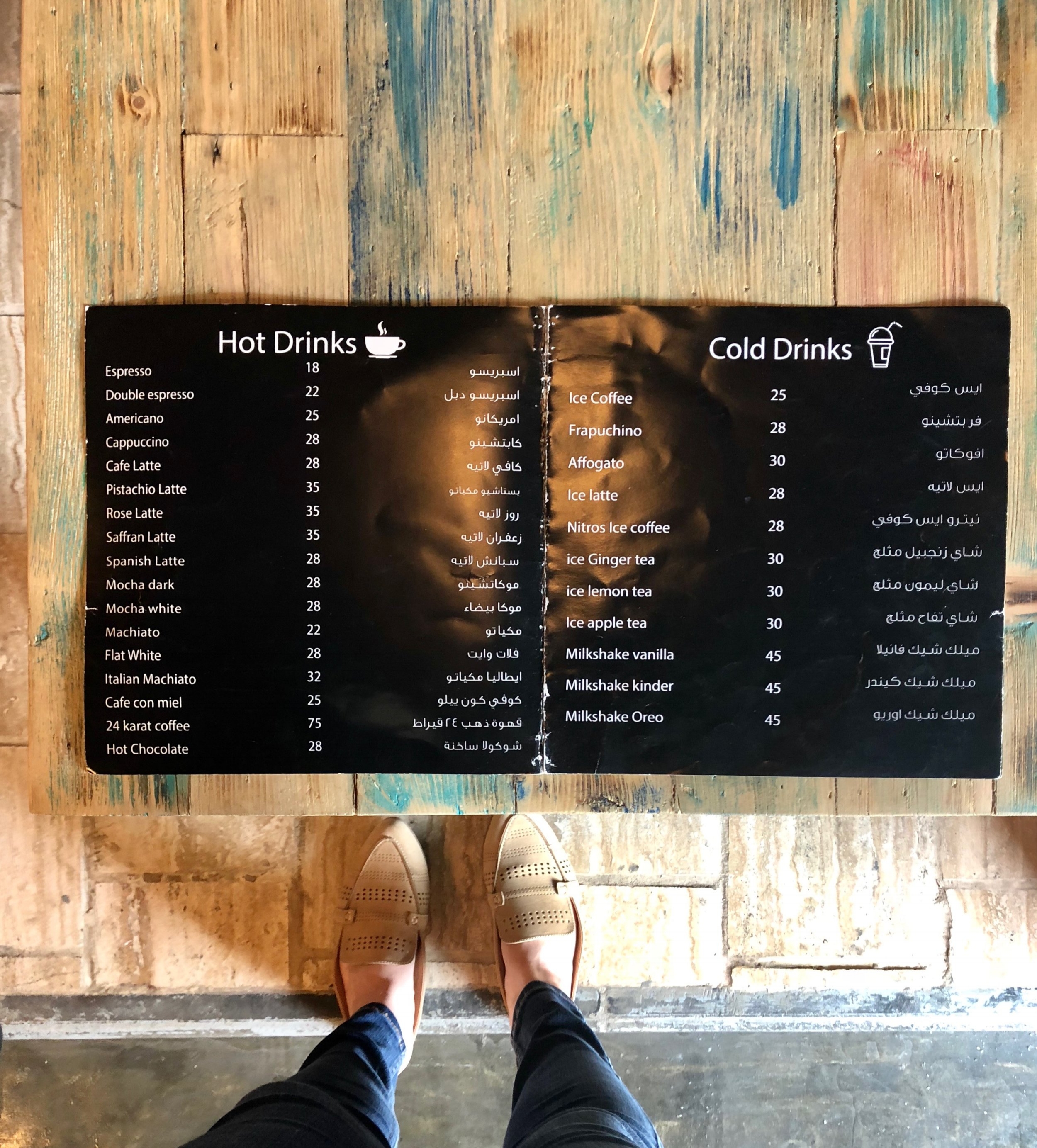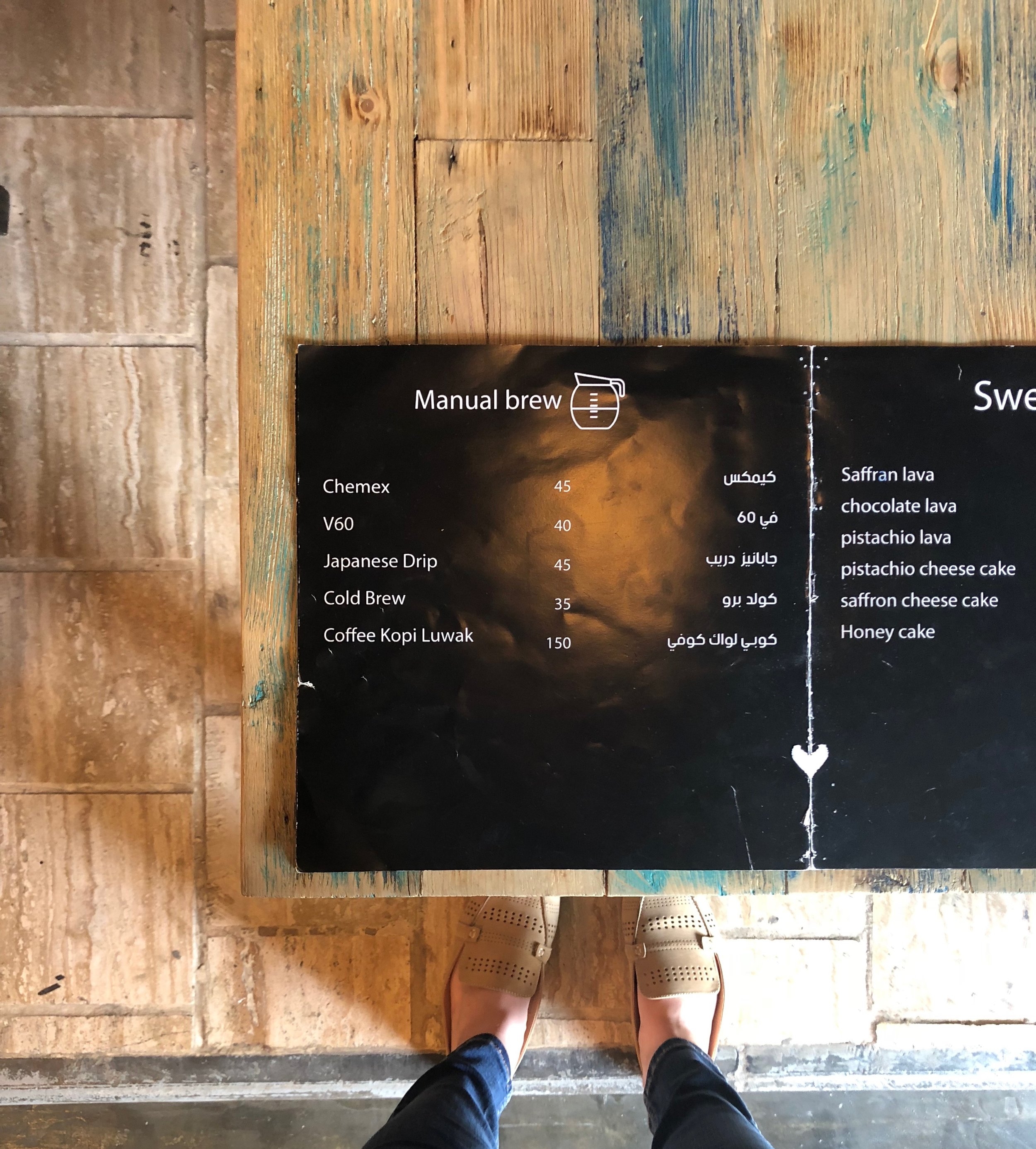N2 Nitro Coffee, Doha, Qatar
Qanat Quartier, The Pearl, Doha, Qatar
We're back to French Arabia, also known as the Pearl.
After a planned coffee outing to Evergreen (see Evergreen Organic write-up), my friends and I were walking back to the parking garage when we spotted another coffee shop across the canal. I was pleasantly surprised by the Pearl area, which is chocked full of unique restaurants. I'd call it the largest foodie (+ coffeE) dig spot in Doha. Fortunately, I've got fantastic friends who indulge my coffee obsession and agreed to an extended coffee adventure. So across the bridge and to another coffee shop we went!
N2 Coffee is an airy space filled with flowery floral furniture and colored wooden tables topped with dried lavender. The furniture inside reminds me of a French-inspired bridal boutique. The modern fixtures and exposed wooden brick bring out a modern vibe that I wasn't quite expecting given the furniture choice. However, we don't necessarily judge coffee shops by their interior, so we can move past that and discuss the coffee!
It took us awhile to figure out if we were supposed to go up to the barista bar to order or if we just take a seat and let them come to us. Being in a new country with new courtesies (and a different language) is always fun! Some awkward laughs and a visit to the coffee bar, the staff told us to just take a seat and they'd come take the order from us.
The menu was full of coffee options -- to include a page dedicated to what they refer to as manual brew. At this point in my time at Doha, I'd become aware that coffee shops are known to have Spanish, Rose and Pistachio Latte options. Beginning to poke its head onto the scene at N2 was a Saffron Latte. Unsurprising given the fact that the Middle East has quite a palette for spices. For example, Arabic Coffee uses saffron and rose water to produce an spicy, almost tea-like coffee.
I was overwhelmed by the number of coffee options. I'd been doing pour-overs at home for a couple months, so I wanted something espresso based, something I could not make on my own. I was craving a Flat White. (Don't let me kid you though; I still haven't quite figured out how to microfoam milk for a Flat White!) One friend opted for the Saffron Latte, another joined me and tried a Flat White for the first time and a third went for an iced Rose Latte. The Flat Whites were alright, though not in the top I've ever had. The Saffron latte was a nice variation, but the Rose Latte ended up being entirely too sweet to finish.
I'd be lying to you if I said that I didn't consider trying the Kopi Luwak Coffee. I've been intrigued with this coffee for years, but it cost 150 riyal, which ends up being about $40 dollars. My hesitation half stemmed from the coffee's questionable source, part due to price and part due to the fact that it's crap coffee -- quite literally.
Kopi Luwak is coffee that is produced from the fecal matter of palm civets, whose primary diet is coffee cherries . The theory for its acclaimed superior flavor is that 1) the palm civet only selects and eats the best coffee cherries and 2) during the digestion process, the chemical composition of the coffee cherry is altered. People are drinking rodent poop. Pretty crazy when you think about it right?
The harvesting of this coffee is contentious. The fecal matter used to be collected from the wild, but producers are now engaging with intensive farming to obtain the desired product. In some cases, the palm civets are kept in small cages and force-fed coffee cherries in isolation, which results in high mortality rates. What was once a luxury is now considered to be something that is tainted with animal cruelty. Some sellers highlight their ethical harvesting and farming practices, but these more human practices can be difficult to prove .
It's pretty crazy when you think about what you're drinking, right? However, apparently is tastes that good. Without knowing more about the coffee's origins, I skipped it. As we found out, the shop was out of the coffee anyway. It just wasn't meant to be!
We asked the staff about their beans and where they come from. Since we didn't know Arabic, it involved lots of talking and pointing but I don't think it involved a whole lot of understanding, at least no understanding on my part. We were able to understand they were espresso beans, but little else :D Unfortunately, N2 also doesn't have a website that I could gather more information from. I did see from their website that they've hosted cupping events and have done comparisons between Arabica and Robusta beans, but I couldn't discern more.
As a side note, they did however, have some delicious made-in-house chocolate cookies topped with pistachios that came complimentary. The smell wafted throughout the space and made me crave more! The coffee came in darling porcelain cups, which I always find so endearing.
All in all, I wouldn't peg this a priority shop to visit again. The staff was friendly and my lack of knowledge on their shop and their coffee beans mostly stems from my inability to speak the host nation's language. I'd love to know the story behind the shop. Nonetheless, the coffees weren't terribly impressive and given the surplus of other coffee shop options, I'd likely skip this one and opt for Flat White or Evergreen Organics (see their write-ups) if I'm in the Pearl area again.












